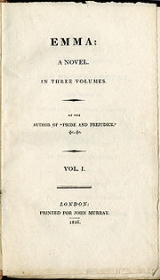
Emma
Emma is a comic novel by Jane Austen, generally regarded as the most perfectly constructed of all her works, concerning the perils of misconstrued romance.
- Can you trust me with such flatterers?
- Does my vain spirit ever tell me I am wrong?
- Emma Woodhouse, handsome, clever, and rich, with a comfortable home and happy disposition, seemed to unite some of the best blessings of existence; and had lived nearly twenty-one years in the world with very little to distress or vex her.
- Ch. 1
- It's such a happiness when good people get together—and they always do.
- Ch. 3
- I am very sorry to be right in this instance. I would much rather have been merry than wise.
- Ch. 7
- I do not know whether it ought to be so, but certainly silly things do cease to be silly if they are done by sensible people in an impudent way. Wickedness is always wickedness, but folly is not always folly.—It depends upon the character of those who handle it. Mr. Knightley, he is not a trifling, silly young man. If he were, he would have done this differently. He would either have gloried in the achievement, or been ashamed of it. There would have been either the ostentation of a coxcomb, or the evasions of a mind too weak to defend its own vanities.—No, I am perfectly sure that he is not trifling or silly.
- Ch. 8
- One half of the world cannot understand the pleasures of the other.
- Ch. 9
- There are people, who the more you do for them, the less they will do for themselves.
- Ch. 11
- If I loved you less, I might be able to talk about it more. But you know what I am. —You hear nothing but truth from me.
- Ch. 13
- Seldom, very seldom, does complete truth belong to any human disclosure; seldom can it happen that something is not a little disguised, or a little mistaken; but where, as in this case, though the conduct is mistaken, the feelings are not, it may not be very material.
- Ch. 13
- It was a delightful visit—perfect, in being much too short.
- Ch. 13
- It is very difficult for the prosperous to be humble.
- Ch. 14
- Nobody who has not been in the interior of a family can say what the difficulties of any individual of that family may be.
- Ch. 18
- Human nature is so well disposed towards those who are in interesting situations, that a young person, who either marries or dies, is sure of being kindly spoken of.
- Ch. 22
- Jane Fairfax is a very charming young woman - but not even Jane Fairfax is perfect. She has a fault. She has not the open temper which a man would wish for in a wife.
- Mr. Knightley, Ch. 33
- Business, you know, may bring money, but friendship hardly ever does.
- Ch. 34
